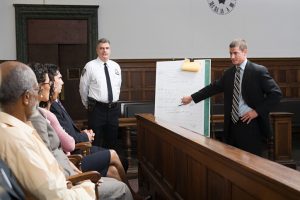Handle Logistics First
Being a trial lawyer requires a lot of thinking, analysis, writing, and other thought work. But don’t forget the basics of the physical realities of the job, especially in court.
 James Baldwin famously wrote, “Money, it turns out, was exactly like sex: you thought of nothing else if you didn’t have it and thought of other things if you did.” Thankfully for us, Baldwin was not a trial lawyer but a great writer, so we have great lines like that and many great books and stories. But if he had been a trial lawyer, he pretty much could have replaced “money” and “sex” with “logistics.”
James Baldwin famously wrote, “Money, it turns out, was exactly like sex: you thought of nothing else if you didn’t have it and thought of other things if you did.” Thankfully for us, Baldwin was not a trial lawyer but a great writer, so we have great lines like that and many great books and stories. But if he had been a trial lawyer, he pretty much could have replaced “money” and “sex” with “logistics.”
Let me explain what I mean by logistics. It’s all those things that inexperienced lawyers may think of that just get done, by a paralegal, or some administrative person, or someone. But just as Oscar Madison of The Odd Couple learned when making turkey that gravy doesn’t simply “come when you cook the meat,” my colleagues and I know that all the logistical work you must do at trial or any evidentiary hearing only happens because you think about it, plan for it, and make it happen.
You need to think about how everything will work in court. Will you need to do everything on paper, or can it be by way of electronics, or both? If paper, do you need binders? How many? For how many people? If electronics, what does that mean? Does the court have video screens or tablets, or do you need to provide them? If the court only has one shared screen for half a dozen jurors, you should think about getting tablets or some other video screens.

Is The Future Of Law Distributed? Lessons From The Tech Adoption Curve
Once you think everything through, you need to plan — weeks, at least, before trial — for everything. Great, you have the binders, but try them out since they might be the wrong size. Okay, you’ve ordered the tablets, but then you realize you need a judge’s order to allow them in court. Get the order. Plan every aspect of every step.
And then make it happen, and that includes doing any dry runs you can. Most court clerks or arbitration case managers welcome a lawyer asking them how things should be, or what the lawyers can or cannot do, rather than being the presumptuous professional that lawyers can often be. Don’t aspire that it will work out; try it out to make sure it all works out.
If you and your team handle all the logistics, then it will be, as Baldwin instructed, like having enough money or sex. You won’t think about, and you can think about those “other things” like winning your case. But if you do not handle the logistics right — if you do not have the copy of the exhibit, the access to the internet or power you thought you did, or the ability to show the jurors and judges the same thing at the same time — then you will drown, and think “of nothing else,” including how to win.
Sponsored

Legal AI: 3 Steps Law Firms Should Take Now

Navigating Financial Success by Avoiding Common Pitfalls and Maximizing Firm Performance

The Business Case For AI At Your Law Firm


Early Adopters Of Legal AI Gaining Competitive Edge In Marketplace
 John Balestriere is an entrepreneurial trial lawyer who founded his firm after working as a prosecutor and litigator at a small firm. He is a partner at trial and investigations law firm Balestriere Fariello in New York, where he and his colleagues represent domestic and international clients in litigation, arbitration, appeals, and investigations. You can reach him by email at john.g.balestriere@balestrierefariello.com.
John Balestriere is an entrepreneurial trial lawyer who founded his firm after working as a prosecutor and litigator at a small firm. He is a partner at trial and investigations law firm Balestriere Fariello in New York, where he and his colleagues represent domestic and international clients in litigation, arbitration, appeals, and investigations. You can reach him by email at john.g.balestriere@balestrierefariello.com.
Sponsored

Is The Future Of Law Distributed? Lessons From The Tech Adoption Curve








